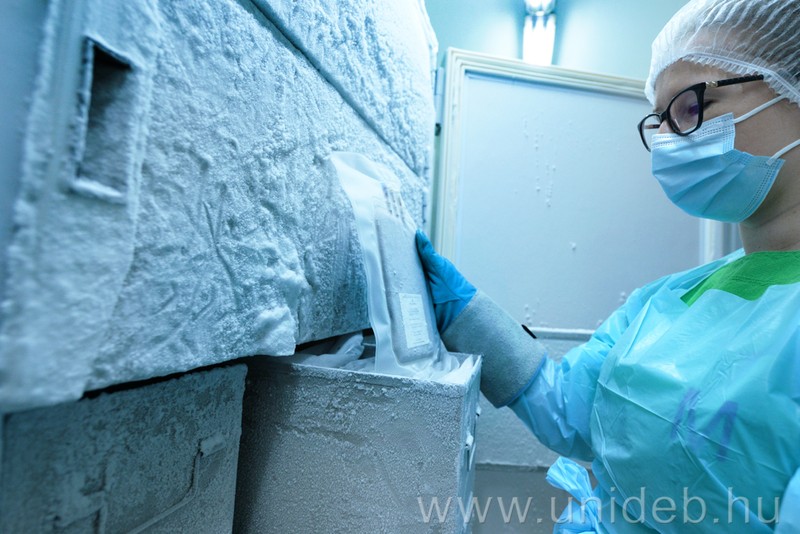As a result of several years of development, a fecal transplant patient care unit and a bacterial cell bank using unique technology were established at the University of Debrecen for the treatment of colitis caused by the bacterium Clostridioides difficile. There is a growing demand for therapy because of COVID.
The pathogen Clostridioides difficile (CD) is also found in the colon of healthy people, but its growth is prevented by other so-called “good” gut bacteria living in the gut. However, if the good bacterial flora dies or changes in composition for some reason, CD can multiply and develop pseudomembranous colitis (CDI), which is a life-threatening disease. Clostridioides difficile produces a toxic substance that damages the intestinal mucosa and causes a high degree of inflammation, hydrothorax, and cell death. Intestinal inflammation can cause diarrhea, weight loss, general physical deterioration, but intestinal death and sepsis can also develop. Most often, antibiotic treatment damages the intestinal flora, but often the patient’s immunodeficiency (old age, chemotherapy of cancer patients, steroid treatment) plays a role in the development of the infection.
Rector György Nagy, Rector, who led the research, told hirek.unideb.hu that due to the frequent use of antibiotics, pseudomembranous colitis had already accumulated in the years before the coronavirus epidemic, but due to the pandemic, more and more patients became ill.
Coronavirus-infected people often receive alternating broad-spectrum antibiotic therapy, in addition to immunosuppressive agents such as steroids to stop the immunological process that damages the lungs. In addition, SARS-CoV-2 infection alone can damage the intestinal mucosa. Experience has shown that the disease is unusually severe and that it is very common to not respond to therapy or to recur after successful treatment,
– the expert explained.
György Gergely Nagy explained that traditionally the treatment of CDI is caused by the elimination of the causative factor and in parallel with the antibiotic acting on Clostridioides difficile, however, it has been repeatedly observed that the disease does not respond or hardly responds to the usual therapy.
A new, internationally accepted treatment procedure for these cases is faecal transplantation, also known as faecal bacterial therapy, faecal microbiotic transplantation (FMT). The essence of the method is to deliver faeces obtained from a healthy person (donor) and converted into a special suspension preparation to the intestinal system of the patient (recipient) through a small intestinal or gastric tube, or by means of colonic reflection. The healthy (“good”) bacterial flora in the stool displaces the venom-producing strain of clostridioides and quickly restores the physiological intestinal flora. With the procedure, a rapid recovery of a few days can be achieved in the majority of patients,
– the medical professional explained.
Stool transplantation was only available in a few domestic institutions before COVID. Due to the epidemic, patients’ access to the procedure was essentially lost outside the University of Debrecen, because the technological background was not in place to guarantee the safety of the recipient and staff during the production of graft from human feces. Among other things, the system developed at the university offers a solution to this challenge.
A unique donor screening protocol involving all elements of COVID screening and including the genetic identification of a variety of other pathogens is used in collaboration with the Institute of Medical Microbiology. The production of stool homogenate for transplantation is performed with a specially developed, sophisticated, closed system, new device, using a frozen stool bank background, which is safer for both the patient and the intervention staff than the technologies traditionally used so far. The Institute of Internal Medicine operates a processing unit dedicated to this task and a -80°C cooling system for the storage of frozen grafts. The process embedded in a unified quality management environment is overseen by a multidisciplinary team of professionals
– emphasized Gergely György Nagy.
With the procedure developed at the University of Debrecen, a number of successful interventions have been carried out in the region before the COVID period. Due to the increased demands due to the epidemic, 65 grafts have been provided for the treatment of 54 patients with CDI with faecal microbiota transplantation since February this year. A significant proportion of patients required treatment as a complication of COVID infection.
We have also started to provide frozen grafts to external institutions outside the university, so we can provide regional-level care in close cooperation with the leading health institutions in the region. Patients in Budapest, Miskolc and Nyíregyháza, among others, were treated with frozen products prepared at the University of Debrecen.
– said the rector’s envoy.
György Gergely Nagy pointed out that the costs of producing grafts for the treatment of patients were borne by the institutions from their own resources in the absence of public funding, but they are confident that this obstacle will be removed in the near future and bacterial cell therapy may become for patients.
Bacterial cell therapy using fecal transplantation may be a solution for other intestinal and possibly immunological diseases in the future.
hirek.unideb.hu












